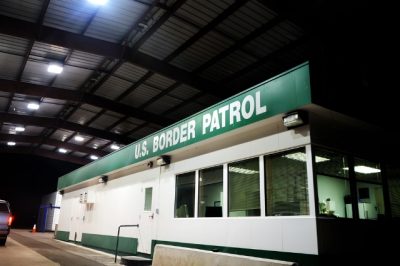Border Enforcement
Migration at the border is a multifaceted issue, challenging the U.S. to secure our borders while upholding the human rights of individuals seeking safety and better opportunities. Balancing national security with compassion and our legal obligations to asylum seekers presents intricate dilemmas, and we collaborate with policymakers to advance bipartisan, action-oriented solutions.
Beyond A Border Solution
- Asylum
- May 3, 2023
America needs durable solutions. These concrete measures can bring orderliness to our border and modernize our overwhelmed asylum system. Read…
Read More
Shoddy Court Process Behind the Record Number of Deportations
The Obama Administration is on record for pursuing the toughest immigration enforcement policies in U.S. history, mostly evidenced by its record numbers of deportations. These numbers speak volumes: last year, nearly 400,000 people were deported from the United States. While these numbers are shockingly high and there has been much discussion about how these actions tear families and communities apart, there has also been an under-reporting of the unfair and often expedited process that leads to the deportation of hundreds of thousands of people each year. In fact, two-thirds of the individuals removed are done so without ever seeing the inside of an immigration courtroom and are not accorded many other basic due process protections. Read More

True Border Security and Legalization Go Hand in Hand
A sticking point in current and past immigration reform proposals has been the misguided belief that a legalization program for unauthorized immigrants cannot proceed until the border is “secure.” The immigration framework developed by the Senate “Group of 8” introduces that same sticky framework by proposing to create certain border-security benchmarks that must be met before a legalization program can begin. Not only has this not worked in the past, given that benchmarks from multiple past proposals have actually already been met, but creating a truly “secure border” actually requires a new understanding of what the problems are at the border. Read More

House Republicans Show Uncertainty About Where the Party Stands On Immigration
For six hours on Tuesday, the Republican-controlled House Judiciary Committee tried to come to terms with a new landscape on immigration reform and where House Republicans will fit into the picture. Despite attempts by committee leadership to paint an earned path to citizenship as an extreme option and questions about whether citizenship was even necessary, there were signs of common ground, signaling opportunities for breaking the logjam on immigration in the House. Read More

Politicians Invent Doomsday Predictions About Immigration Reform
Nativists are rarely encumbered by facts. By its very nature, nativist rhetoric is based on stereotype and mythology, not empirical evidence. Regrettably, some of our elected leaders in the House of Representatives and the Senate have embraced the mirage of nativism as they embark on a crusade to derail any meaningful reform of the U.S. immigration system. More precisely, anti-reform politicians have been issuing doomsday predictions about what will happen to the nation if a legalization program is created for unauthorized immigrants already living in the United States. It comes as little surprise that these predictions have no basis in reality. Read More

Incentivizing Arrests for Border Patrol Agents
Strengthening border security, including increasing the number of border patrol agents, continues to be a component of the latest immigration reform proposals, as they have in the past. What may be overlooked in these proposals is the administration’s call for enhanced training to protect civil rights. This is critical, given the results of a new report by Families for Freedom and New York University School of Law’s Immigrant Rights Clinic titled, Uncovering USBP: Bonus Programs for United States Border Patrol Agents and the Arrest of Lawfully Present Individuals. The report describes a series of operational flaws within USBP, including a previously undisclosed employee rewards program to encourage arrests. Read More

New Report Shows That Border Benchmarks Already Have Been Met
As the components of what should be included in an immigration reform bill take shape, border security, along with enforcement, is proving to be a key part of the framework. Eight senators released a bipartisan proposal earlier this week that included a path to citizenship for the 11 million unauthorized immigrants currently living in the United States. The catch is that implementation of this provision is “contingent upon our success in securing our borders and addressing visa overstays.” The day after the senators presented their framework, President Obama laid out his vision of what should be included in immigration reform legislation during a speech to labor leaders in Nevada. The president called for a clear path to citizenship that’s not contingent on securing the border, but he said the nation needs to stay focused on immigration enforcement. “That means continuing to strengthen security at our borders,” Obama said during his speech. “It means cracking down more forcefully on businesses that knowingly hire undocumented workers.” Read More

Federal Judge Leaves Anti-DACA Lawsuit Hanging By a Thread
Lost amidst coverage of recent immigration reform proposals was a ruling issued last Friday in Kris Kobach’s legal crusade against the Deferred Action for Childhood Arrivals (DACA) program. The lawsuit, filed last summer in a federal court in Dallas, alleges the program violates an obscure provision of the immigration laws that supposedly prohibits immigrants who entered the country unlawfully from receiving deferred action. Although the ruling in question allowed the case to move forward, the presiding judge rejected the vast majority of Kobach’s arguments and left the suit hanging by a thin legal thread. Read More

President Lays Out His Vision For Immigration Reform
After eight Republican and Democratic senators yesterday released their framework for comprehensive immigration reform, President Obama laid out his administration’s vision today of what he thinks should be included in the bill to overhaul the nation’s immigration system. He praised the bipartisan principles, which mirror the White House’s 2011 blueprint for immigration reform. “At this moment, it looks like there’s a genuine desire to get this done soon,” he said in his speech from Nevada. “And that’s very encouraging.” Read More

Senators Unveil Framework for Effective Immigration Reform
Eight Senators today released a “Bipartisan Framework for Comprehensive Immigration Reform” which proposes an overhaul of our legal immigration system while expanding border security measures and hardening current employment verification procedures. Most notably, the proposal would give unauthorized immigrants already in the country a chance to earn U.S. citizenship. Although the framework is only a very rough outline of what comprehensive immigration reform legislation might look like, the principles it espouses constitute an excellent starting point for the legislative negotiations that will now being in earnest. The Senators involved in the negotiations—Democrats Chuck Schumer (NY), Dick Durbin (IL), Bob Menendez (NJ), and Michael Bennet (CO); and Republicans John McCain (AZ), Marco Rubio (FL), Lindsey Graham (SC), and Jeff Flake (AZ)—outlined four “legislative pillars” for immigration reform: Read More

Getting to a Citizenship Consensus
Immigration reform is enjoying a resurgence of support in both parties, with groups from a variety of backgrounds coming out in favor of a range of changes to our current system. The most striking change may be the melting of opposition to a pathway to citizenship for the 11 million undocumented immigrants in the U.S. But acceding to citizenship and creating a system that will actually allow people to get there are two different things. Read More
Make a contribution
Make a direct impact on the lives of immigrants.

